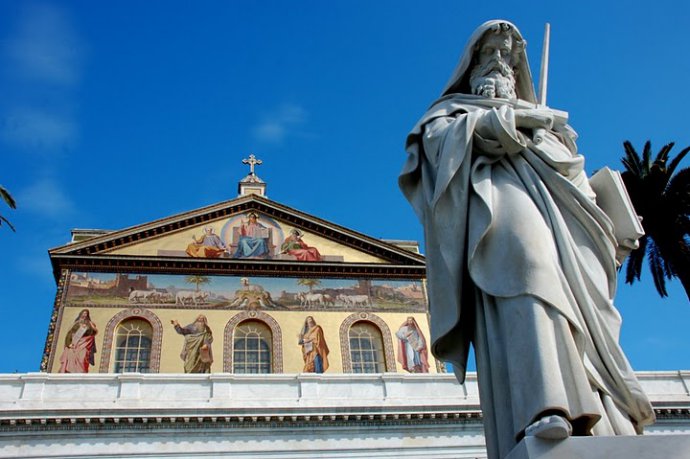The Christian sense of intellectual spiritual challenge was just about completely absent from the religions of the early Roman Empire.
基督教中對于個體心智和精神上的這種挑戰(zhàn)在早期羅馬帝國國教里是完全找不到的。
During the time of the Pax Romana Christian beliefs were in a stat of flux,
羅馬和平時期,基督教信仰處于不穩(wěn)定狀態(tài),
a belief in Jesus as a Messiah had lead to expectations of an imminent second coming,
認(rèn)為耶穌是救世主的信念讓人們期望耶穌的再度降臨于世,
as these expectations started to fade and transform themselves the Christian church began to prepare itself for an eventual second coming. Which nobody could predict accurately.
隨著這些期望漸漸的消退發(fā)生轉(zhuǎn)變,基督教堂也開始做好準(zhǔn)備進(jìn)行最后的再度降臨。具體什么時候,沒有人能夠準(zhǔn)確預(yù)測。
One task was organizational the Christian church began to develop a hierarchy of religious leaders and specific rituals of worship.
而準(zhǔn)備工作中的一個任務(wù)就是組織結(jié)構(gòu)上的基督教堂開始發(fā)展出宗教領(lǐng)導(dǎo)等級體系和具體的禮拜儀式。

This task of course required close study of Jesus' teachings through spiritual and organizational guidance.
要完成這項任務(wù),當(dāng)然就得通過精神和組織上的指引來仔細(xì)研讀耶穌的教義。
The church had also to define a working relationship with the secular world in general, and the Roman government in particular.
教堂也得明確規(guī)定自己和俗世的關(guān)系,尤其是和羅馬政府的關(guān)系。
Yet the Christian church remained distinctly aside from the secular world.
但是基督教堂一直都遠(yuǎn)離俗世生活。
Openly turning its back on the logic and reason employed by the emperors who ruled it.
公然背離羅馬皇帝所運用的邏輯和理性。
The Christians tended to believe more in faith,
基督教徒更傾向于相信信仰,
and they drew purpose for their existence from the belief that they were created by God the father
他們?yōu)樽约捍嬖诘哪康乃O(shè)定的信念是他們是由天父上帝創(chuàng)造出來的。
and saved by the sacrifice of Jesus Christ.
由耶穌犧牲自己而得到拯救。
During the comparative prosperity of the Pax Romano and especially the time of the five good emperors
在羅馬和平時期相對的繁榮盛世,尤其是五賢帝統(tǒng)治時期,
this strength of faith and sense of personal worth did not seem like a big deal to a wide number of Romans.
這種信念的力量和個人價值觀,對于大多數(shù)羅馬人而言并沒有什么大不了。
But as the empire began to crumble and break the Christian church made converts a whole lot more easily.
但是隨著帝國開始走向衰落,基督教堂就讓皈依變得簡單多了。
And Matthew, 22, 21: "Jesus bids the Pharisees render unto Caesar the things that are Caesars and render unto God the things that are God's" .
馬太福音22 21中寫道,耶穌說:“這樣,凱撒的物當(dāng)歸給凱撒神的物當(dāng)歸給神。”
The Christian's self assurance was off putting to those Romans who did not believe.
基督教徒的自恃對于那些不信仰基督教的羅馬人而言是令人厭惡的。
Nor did the Christians render all the things unto Caesar, which Caesar demanded.
基督教徒也沒有按照凱撒的要求全身心效忠凱撒。
They could and did work at their jobs pay their taxes and even serve in the military,
他們能夠也的確好好工作,上繳稅款,甚至參軍,
but the Christians could not and would not and did not join in the old Roman stat rituals.
但是基督教徒不能,不愿意,也沒有參加古老的羅馬國教禮儀,
Or take part in the modern Roman emperor cult.
或者是參加對羅馬皇帝的個人崇拜禮儀。
The Christian's unwillingness to play along was tolerated in better times, but worse times were on the horizon.
在情況好的時候,基督教徒的這種不情愿得到了容忍,但是糟糕的時刻即將到來。
When bad times came, the Romans immediately assumed that the Pax Deiorum was being violated.
羅馬人認(rèn)為祖先的遺風(fēng)受到了褻瀆。
And the Christians would be the leading suspects.
而基督教徒是最主要的受懷疑對象。
In suggesting that Christianity weakened Rome's moral fiber the enlightenment historians are oddly enough bringing up a charge
啟蒙時期的史學(xué)家很奇怪地提出基督教削弱了羅馬的道德意志將之怪罪于基督教,
that the roman pagans themselves made all the time.
但事實上這卻應(yīng)該歸咎于羅馬異教徒自己。



